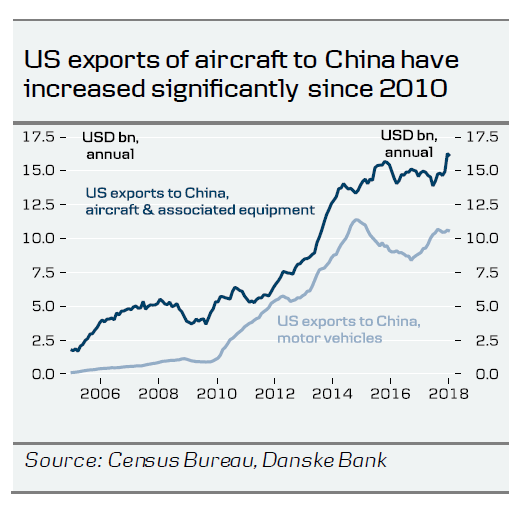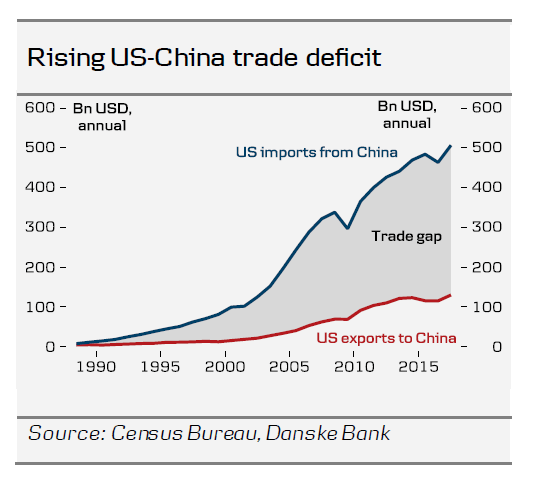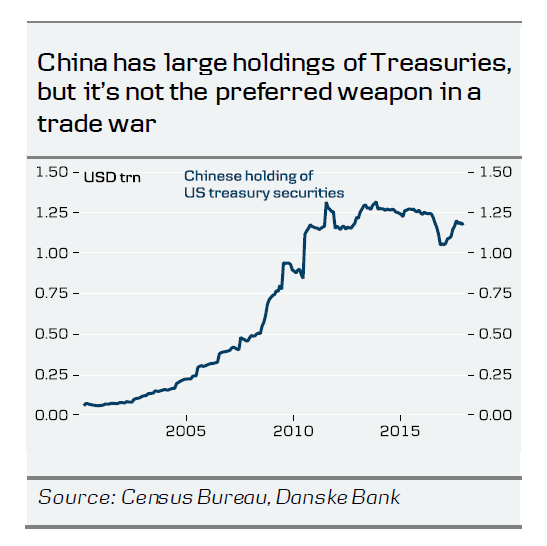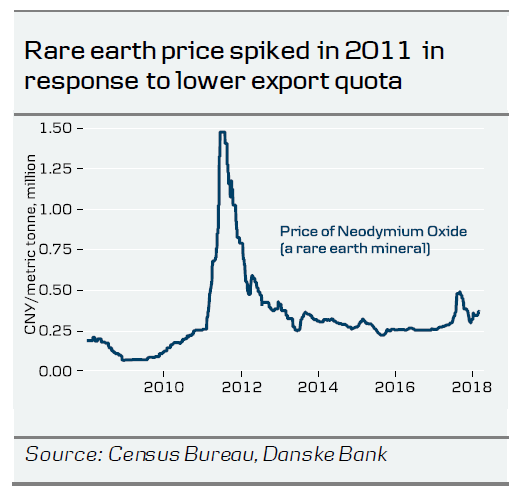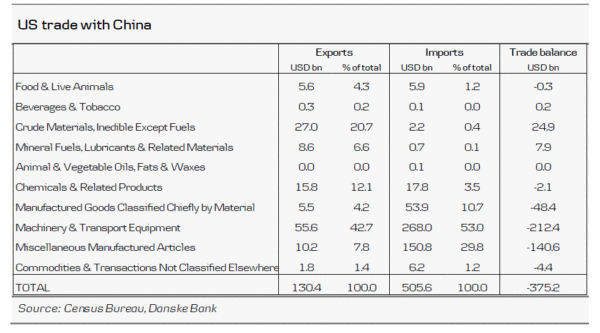- There is little doubt that China would retaliate against any protectionist measures directed at it by the US. In this report we highlight 10 areas where China could strike back.
- Soybeans, grains and aircraft would likely be the most in scope as this could hurt Trump in politically important areas. US consumer goods in China could also suffer as a result of a potential (mild) consumer boycott.
- China could sell US treasuries, but we do not expect this to be the first line of defence as it would also hurt China and could lead to financial instability globally.
- While we expect China to retaliate against any protectionist measures from Trump, we believe it would tread carefully and not strike back too hard.
- Our baseline scenario is not a large-scale trade war. However, the risk remains as long as there are further trade measures looming.
We expect the next front in the global trade tensions to be between the US and China. This week, several media outlets reported that Trump is preparing direct protectionist measures against China and it seems to be more a matter of when than if when it comes to US action against China.
This would almost certainly lead to retaliation. In response to the US tariffs on steel and aluminium, China’s vice-foreign minister, Zhang Yesui, said “we will not sit idly by and will take necessary measures if the US hurts China’s interests”. So where could China move? We provide a list of potential areas below:
1) Soybeans: China is the biggest buyer of US soybeans, accounting for 60% of US soybean exports. On concerns of a trade war, the American Soybean Association requested a meeting with Trump after he announced tariffs on steel and aluminium. A Chinese tariff on US soybeans would divert demand to other large soybean exporters such as Brazil and Argentina at the expense of US soybean farmers.
2) Beef: In a trade deal between Trump and Xi Jinping in May 2017, China opened up to US beef exports after a 14-year break. It gave the US access to the fastest-growing meat market in the world and Trump celebrated the deal with a tweet saying “China just agreed that the US will be allowed to sell beef, and other major products, into China once again. This is REAL news!” Commerce Secretary Wilbur Ross called the agreement a “herculean accomp lishment” and argued that the deal represented the biggest accomplishment in US-China trade negotiations “in the whole history of USChina relations”. However, China could step back from the deal and limit access again, thus hurting US beef exporters.
3) Aircraft: Next to soybeans, aircraft are the second-biggest US export good to China. It would not be hard to substitute Boeing aircraft with Airbus instead. China’s major airlines are state-owned enterprises and aircraft purchases could be changed easily from Boeing to Airbus.
4) Grains: Sorghum and other grains used for feeding livestock are also in scope for retaliation. Sorghum is farmed chiefly in the US for export to China. In February this year, China launched an anti-dumping probe into US sorghum exports – two weeks after Trump imposed tariffs on washing machines and solar panels. It was generally seen as a clear warning that sorghum could be targeted if needed in a retaliatory response.
5) November 2017 deals of USD250 billion: During Trump ’s visit to Beijing in November 2017, he came back to the US with trade deals worth USD250bn. One of the deals was the sale of 300 Boeing aircraft worth USD37bn alone. However, the deals were reported to be mainly in the form of memoranda of understanding, and China could choose to walk away from some of these.
6) Tariffs on a broad range of US goods: According to recent news reports, Trump is considering imposing tariffs on Chinese goods in a broad range of areas such as telecommunications and apparel. China could choose to take the same approach.
7) Consumer boycott: If sentiment among Chinese consumers turned against the US, it could hurt US brands. It could, for example, hurt US car sales in China, which in 2017 were worth close to USD10bn. As the fastest-growing consumer market in the world, even a ‘mild’ consumer boy cott in China would hurt US companies. A similar effect is not possible in the US, as China export s very few consumer brands to the US. Most consumer goods going from China to the US are actually US brands such as Apple and Nike.
8) US investments in China: If the US puts greater restrictions on Chinese investments in US companies, China may do the same to US investments in the country. China is currently opening up to foreign investments in new areas – for example in the financial sector. However, US companies could be discriminated against in terms of access to the Chinese market. This could happen both directly and indirectly by prolonging application processes, etc.
9) US treasury bonds: China holds more than USD1tr of US treasury bonds. A large sale of these could push up US bond yields. Selling US treasury bonds is not likely to be the first line of defence though, as it would lead to losses on China’s own p ortfolio and could easily cause havoc in financial markets and backfire on China.
10) Rare earth exports to the US: China has close to a monopoly in the 17 rare earth minerals, with around 90% of global mining. Rare earth minerals are used in products such as mobile phones, LED displays and atomic batteries that power guided missiles. In 2010, China halted exports of rare earth minerals to Japan after an incident that angered China. In 2011, prices spiked when China imposed export quotas on the minerals.
There are thus plenty of areas where China could retaliate and make it expensive for Trump to launch protectionist measures – both economically and politically. According to a story in The Washington Post, the chairman of AmCham China’s p olicy committee, Lester Ross, said it was likely that the Chinese authorities would target retaliation against sectors that have ‘political resonance’ in the US . In particular, “that might mean favouring Europe’s Airbus over Boeing for aircraft orders, or cutting imports of agricultura commodities, whose producers are predominantly in states that voted for Trump”. We agree that these are the most likely areas China would use in any retaliation.
However, we still expect China to tread carefully in order to not trigger even larger protectionist measures from Trump and start a tit -for-tat trade war that would hurt the Chinese economy on a larger scale. However, as long as new measures are looming, uncertainty over a potential escalation would remain

